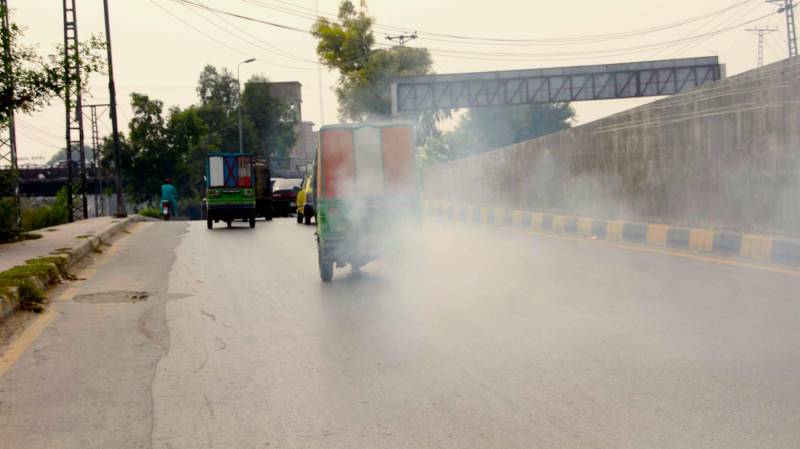
Pakistan continues to be one of the most polluted countries in the world, ranked second by the World Air Quality Report 2023, published by IQAir on Tuesday.
Lahore was ranked as the most polluted mega city in the world.
IQAir found that Pakistan's annual average particulate matter (PM2.5) concentration was 14 times above the World Health Organisation (WHO) guidelines at a national average of 73.7 μg/m³.
According to the Pakistan Air Quality Initiative (PAQI), this leads to a loss in life expectancy of 4.4 years across Pakistan.
Bangladesh (top) and India (third) joined Pakistan in the top three. Out of 134 countries and regions where air quality was recorded, 124 exceeded WHO annual PM2.5 guidelines. Seven countries met the WHO annual PM2.5 guidelines (annual average of 5 µg/m3 or less): Australia, Estonia, Finland, Grenada, Iceland, Mauritius, and New Zealand.
Lahore was ranked the fifth most polluted city in the world overall and the most polluted mega city, with pollution levels at 99.5 μg/m³, some 20 times higher than WHO guidelines for exposure to fine particulate pollution.
Pollution levels in Lahore were worse than those in New Delhi, India, where the average was around 92.7 μg/m³.
Data reported by the Environmental Protection Department of Punjab for Lahore also showed alarming levels of hazardous air pollution at 108 μg/m³. Especially alarming were the pollution levels during the smog season, which averaged 251 μg/m³ in November, underlying the need for urgent action.
"These dangerous levels of air pollution significantly contribute to multiple health issues in Pakistan, causing chest infections and lung cancer as well as worsening lung diseases such as asthma and chronic obstructive pulmonary disease (COPD)," said Dr Saima Saeed, the Head of Pulmonology and the director of Lung Health Programme at the Indus Hospital and Health Network.
"Pakistan's poor air quality makes other non-communicable diseases such as strokes, mental health issues and diabetes more likely. Air pollution is also known to affect fertility and the cognitive development of children."
Part of the data in this report was recorded thanks to on-ground measurements by the Pakistan Air Quality Initiative (PAQI), which has deployed several monitoring stations since 2016. These unofficial monitoring stations fill a significant gap in government-operated regulatory monitoring of air pollution, which is mandated to monitor and report a number of criteria pollutants to the public.
The worst polluted cities in Pakistan were Lahore (99.5), Faisalabad (88.2), Peshawar (76.5), Rawalpindi (59.5), Karachi (56.4) and Islamabad (42.4).
"Islamabad has gone up from seventeenth place to ninth in the list of most polluted capitals in the world, while Pakistan has been ranked as the second most polluted country for the first time after being third consistently," according to Dawar Hameed, the Chief Executive Officer of PAQI.
"All of this has happened at a time when the economy is weak, and overall activities are lower than in previous years. These indicators are showing that poor air quality is a crisis that has minimal attention from successive governments, and consequently turned into a daunting public health crisis."
Particulate matter pollution is especially dangerous for health as it can penetrate lung tissue and enter the bloodstream. Other pollutants include carbon monoxide, nitrogen oxides, and sulfur oxides, which should also be monitored and regulated to be within safe limits.
"A clean, healthy, and sustainable environment is a universal human right. In many parts of the world the lack of air quality data delays decisive action and perpetuates unnecessary human suffering. Air quality data saves lives. Where air quality is reported, action is taken, and air quality improves," states Frank Hammes, Global CEO of IQAir.
Local and regional efforts are required to manage air pollution in Pakistan and strengthen and build the capacity of regulatory bodies to monitor emissions.

